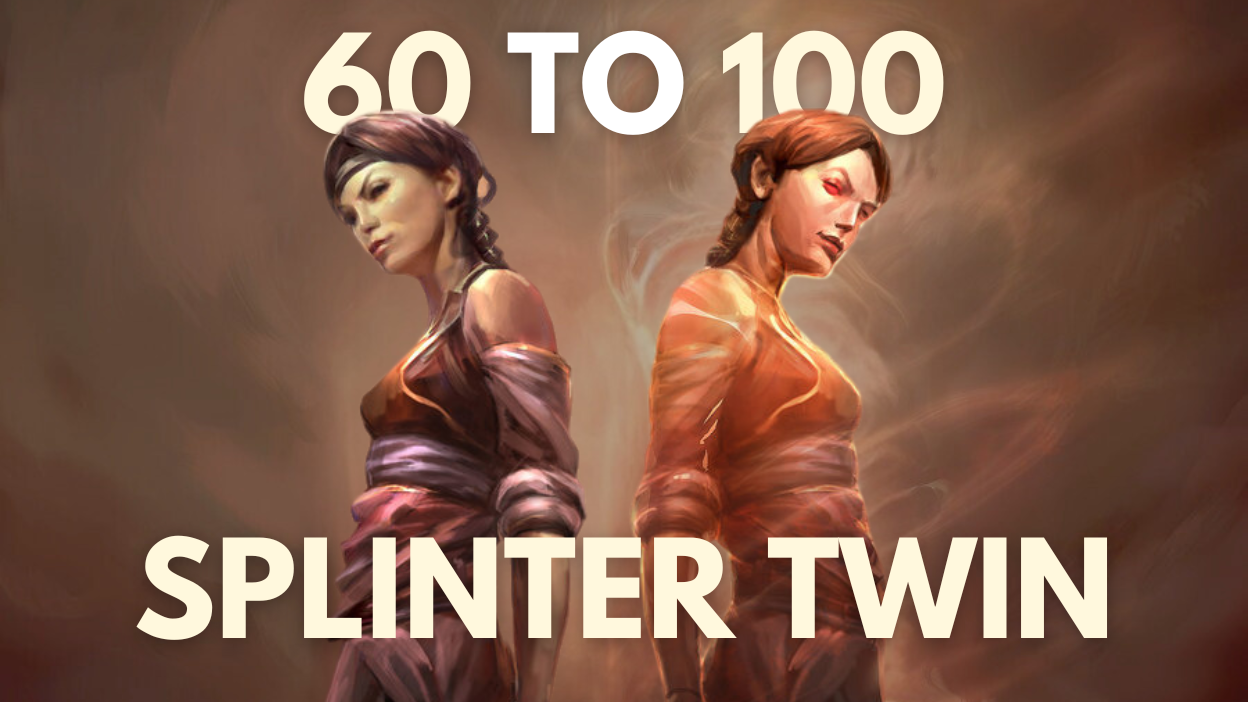60 to 100: Jeskai Splinter Twin

Splinter Twin by Goran Josic
Somehow, Splinter Twin Has Returned . . .
Hello! Welcome to the first (modern day) installment of 60 to 100, a series where we convert beloved decks from 60-card formats to Commander.
It's finally happened! After eight long years, Splinter Twin
In Modern, Izzet () versions of the Splinter Twin
With the introductions out of the way, let's look at Modern Jeskai Twin and see how we can port it over to Commander.
Jeskai Twin - 1st Place GP Pittsburgh 2015
View on ArchidektCreatures (14)
Sorceries (4)
Instants (16)
Enchantments (3)
What is the Splinter Twin Combo?
All you need to do to win a game with Splinter Twin is enchant a creature that can untap another creature when it enters, like Deceiver Exarch
Kiki-Jiki, Mirror Breaker
Now that we know how the combo works, let's pick a commander for the deck and get started.
Choosing a Commander
Unfortunately for us, there is no commander that does much to enable our combo. This is likely a net positive for the format. Every Spike, including me, would likely be terrorizing your Commander tables with it otherwise. I've chosen Aragorn, King of Gondor
Additional Combo Pieces
Zealous Conscripts
In the years since the Splinter Twin
Fear of Missing Out
These three, along with all previously mentioned combo pieces, will be included in the deck. All together, that's two copy enablers and six untap creatures. In a 100-card deck, that isn't actually that many. We need to find them somehow. How do we do that? A lot of tutors.
Tutors
The main reason I wanted to add white to the deck is the plethora of enchantment tutors it gives us access to. Enlightened Tutor
Imperial Recruiter
This deck also makes excellent use of transmute cards. Muddle the Mixture
Interaction
Counterspells are meant to be used proactively in this deck. That means, generally speaking, you should be using them to protect your combo rather than stop opposing threats. Your opponent's Ghalta, Primal Hunger
Because we often won't care about about opposing threats, the deck includes a number of modal removal spells that can be used to take care of a problematic permanent or provide some sort of protections for the combo. For example, Destroy Evil
Protection
The best way to win a war on the stack is by not allowing it to start. Teferi, Time Raveler
Draw
Cantrips are only kind of card draw. Casting a cantrip is card-neutral: you play one card and get one back. The benefit you receive is card selection. That's what this deck is after more than anything. I want to look at two or three cards, pick the best one (usually a combo piece), and throw the rest somewhere else. The goal is to sculpt your hand to be both pieces of one of the combos and a couple interactive spells. A card like Brainstorm
Our bigger draw spells serve a similar function to the cantrips. With certain powerful exceptions, like Treasure Cruise
Recursion
I would very much describe this deck as "all in." You either win with the Splinter Twin
The Manabase
The Murders at Karlov Manor surveil lands are my favorite cards released in 2024 and they do not disappoint here. This deck wants a lot of card selection and this cycle of lands turns all nine of the deck's fetch lands into free card selection. I have all but stopped including Triomes in my decks because I would always rather have one of these.
The rest of our manabase is fairly standard. Fetches, shocks, various dual lands that enter untapped, and some basics to protect against Blood Moon
Jeskai Twin
View on ArchidektCommander (1)
Creatures (14)
- 1 Brazen Borrower // Petty Theft
- 1 Corridor Monitor
- 1 Deceiver Exarch
- 1 Drift of Phantasms
- 1 Fear of Missing Out
- 1 Flamescroll Celebrant // Revel in Silence
- 1 Heliod's Pilgrim
- 1 Imperial Recruiter
- 1 Kiki-Jiki, Mirror Breaker
- 1 Moon-Blessed Cleric
- 1 Pestermite
- 1 Recruiter of the Guard
- 1 Restoration Angel
- 1 Zealous Conscripts
Enchantments (1)
Instants (28)
- 1 Argivian Find
- 1 Borne Upon a Wind
- 1 Boros Charm
- 1 Brainstorm
- 1 Brainsurge
- 1 Counterspell
- 1 Deflecting Swat
- 1 Destroy Evil
- 1 Dig Through Time
- 1 Disenchant
- 1 Dispel
- 1 Dovin's Veto
- 1 Enlightened Tutor
- 1 Fierce Guardianship
- 1 Flare of Denial
- 1 Flusterstorm
- 1 Impulse
- 1 Lightning Bolt
- 1 Memory Deluge
- 1 Muddle the Mixture
- 1 Path to Exile
- 1 Remand
- 1 Reprieve
- 1 Silence
- 1 Swan Song
- 1 Swords to Plowshares
- 1 Three Steps Ahead
- 1 Valorous Stance
Sorceries (9)
Artifacts (8)
Planeswalkers (1)
Lands (38)
- 1 Arena of Glory
- 1 Arid Mesa
- 1 Bloodstained Mire
- 1 Command Tower
- 1 Deserted Beach
- 1 Elegant Parlor
- 1 Exotic Orchard
- 1 Flooded Strand
- 1 Hall of Heliod's Generosity
- 1 Hallowed Fountain
- 1 Inspiring Vantage
- 3 Island
- 1 Marsh Flats
- 1 Meticulous Archive
- 1 Misty Rainforest
- 3 Mountain
- 1 Perilous Landscape
- 2 Plains
- 1 Polluted Delta
- 1 Prismatic Vista
- 1 Sacred Foundry
- 1 Scalding Tarn
- 1 Sea of Clouds
- 1 Seachrome Coast
- 1 Spectator Seating
- 1 Spirebluff Canal
- 1 Steam Vents
- 1 Stormcarved Coast
- 1 Sundown Pass
- 1 Thundering Falls
- 1 Training Center
- 1 Windswept Heath
- 1 Wooded Foothills